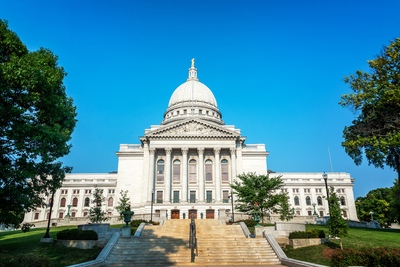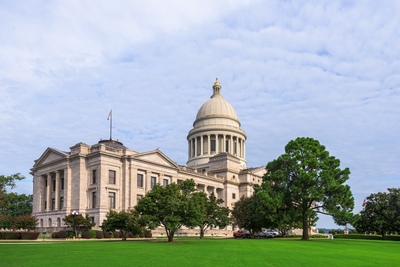
Elections & Campaigns
2026 State Elections Could Reshape Trifecta Control (States to Watch)
February 5, 2026 | Bill Kramer
February 6, 2017 | Max Rieper
Last week, White House Senior Adviser Kellyanne Conway announced that President Donald Trump will not be releasing his tax returns, even after the completion of the audit he had previously cited as a reason for not doing so. Although there are no legal requirements for presidential candidates to disclose tax returns, it has been a customary practice of every major candidate since 1972. With questions surrounding President Trump's vast business holdings, some states are now considering legislation that would make it a legal requirement for presidential candidates to disclose tax returns.
Since the 2016 election in November, lawmakers in ten states have proposed legislation requiring presidential candidates to disclose their tax returns (check out the detailed chart at the end of this post). Lawmakers in the District of Columbia, Maine, and Pennsylvania have also announced plans to introduce similar legislation. Aside from Pennsylvania, each of those states voted for Hillary Clinton in the 2016 election.
Many of the bills are modeled after legislation introduced in New York by State Senator Brad Hoylman (D) in 2016, called the Tax Returns Uniformly Made Public (“TRUMP”) Act. That bill (NY SB 8217) would require presidential and vice presidential candidates to release their last five years of tax returns no later than 50 days before the election. If a candidate has not met that requirement, the name of that candidate will not appear on state ballots. Senator Hoylman introduced a similar bill (NY SB 26) this year.
Other lawmakers have taken a different strategy, like State Senator Michael Barrett (D) in Massachusetts whose bill (MA SD 98) would prohibit Massachusetts voters in the Electoral College from voting for a candidate who has not complied with its tax return disclosure requirements and would even apply to candidates in party primaries.
The legality of these bills is not entirely clear. In the 1983 U.S. Supreme Court case Anderson v. Celebrezze, the Court held that state-imposed ballot restrictions for presidential races had national implications that had to be considered. In U.S. Term Limits, Inc. v. Thornton in 1995, the Court struck down state-imposed term limits on congressional candidates, holding that states had no authority to impose additional requirements for holding office in Congress than were required under the U.S. Constitution. However, in Bush v. Gore in 2000, the Court reaffirmed the right of states to have broad authority to conduct elections.
State legislation to compel national presidential candidates to disclose information isn't new. When President Barack Obama was a candidate, legislators in several states introduced proposals to require the disclosure of a birth certificate for a candidate to be placed on the ballot as a presidential candidate. Arizona even passed such a bill out of the legislature, but Republican Governor Jan Brewer vetoed it.
Lawmakers in Congress have also proposed federal legislation to compel presidential candidates to disclose tax returns. U.S. Senator Ron Wyden (D) of Oregon introduced a bill (US S.2929) last May that would have required presidential candidates to disclose the three most recent taxable years within 15 days after receiving the nomination of a major party, with Rep. Anna Eshoo (D-CA) introducing a version in the House (US H.R.5386). But with Republicans controlling Congress, the bills went nowhere.
Most of these bills will likely not become law, but it's still interesting to see how presidential politics trickle down to the state-level lawmaking process.
| State | Bill | Years of Tax Returns | Disclose By | Failure to comply |
| California | S.B. 149 | Last five years | 70 days before election | Not on ballot |
| Connecticut | H.B. 6574 | Last five years | Not available yet. | Not on ballot |
| Connecticut | H.B. 6575 | Last three years | Not available yet. | Not on ballot |
| Hawaii | S.B. 150 | Most recent return | 60 days before election | Not on ballot |
| Massachusetts | S.D. 98 | Last five years | 2nd Tuesday in September | No electoral votes |
| Maryland | S.B. 358 | Last five years | 65 days before election | Not on ballot |
| New Mexico | H.B. 204 | Last five years | 56 days before election | Not on ballot |
| New Mexico | S.B. 118 | Last five years | 56 days before election | Not on ballot |
| New Jersey | A.B. 4520 | Last five years | 50 days before election | Not on ballot |
| New York | S.B. 26 | Last five years | 50 days before election | Not on ballot |
| Rhode Island | S.B. 91 | Last five years | 50 days before election | Not on ballot |
| Virginia | H.B. 1543 | Last five years | By primary deadline | Not on ballot |
| Virginia | H.B. 2444 | Last ten years | By primary deadline | Not on ballot |

February 5, 2026 | Bill Kramer

February 4, 2026 | Maggie Mick

January 23, 2026 | Andrew Jones